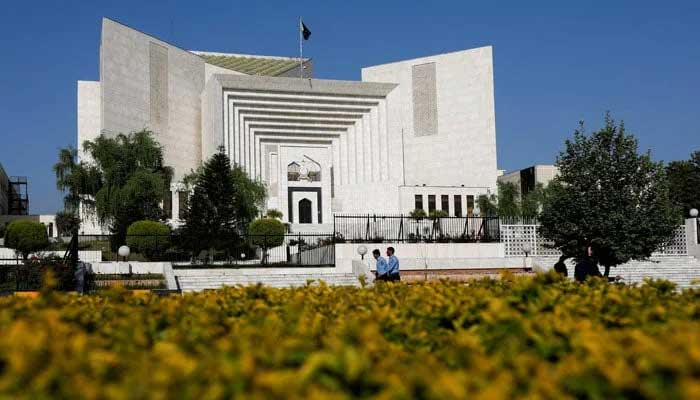SC hears pleas challenging bill clipping CJP's powers

The Supreme Court (SC) resumed on Monday, the hearing on the pleas challenging the SC (Practice and Procedure) Act, 2023, curtailing the chief justice’s powers.
An eight-member larger bench of the apex court headed by Chief Justice of Pakistan (CJP) Umar Ata Bandial and comprising Justice Ijaz ul Ahsan, Justice Munib Akhtar, Justice Sayyed Mazahar Ali Akbar Naqvi, Justice Muhammad Ali Mazhar, Justice Ayesha A Malik, Justice Syed Hasan Azhar Rizvi and Justice Shahid Waheed, is hearing the pleas.
On the previous hearing, CJP Bandial had turned down the attorney general's plea to withdraw the stay order restricting implementation on the bill, the top court had passed on April 13.
“Our stay order of the last hearing is in place. Law related to the Supreme Court rules are very clear,” the chief justice had said.
Meanwhile, a request for the constitution of a full court and removal of some judges from the bench, for hearing the case had also been made during the last hearing.
While adjourning the hearing till today, CJP Bandial directed all parties in the case to submit written arguments in the case, and also sought the record of the debate held in the Parliament and standing committee on judicial reforms.
“We will resume the case on Monday (May 8) and then review all the issues,” CJP Bandial had said.
Background
The bill aimed at regulating the powers of the CJP, was approved by the Parliament during a joint sitting on April 10.
The National Assembly, on April 21, notified the Supreme Court (Practice and Procedure) Bill 2023 as an act.
The bill's implementation was halted by the same bench hearing the case today.
The top court on April 13 had stopped the implementation of the law observing that if the law received the assent of the president, the bill would not be acted upon in any manner till further order.
“The moment that the Bill receives the assent of the President or (as the case may be) it is deemed that such assent has been given, then from that very moment onwards and till further orders, the Act that comes into being shall not have, take or be given any effect nor be acted upon in any manner,” read the nine-page interim order issued on April 13.
In its order, the bench stated that the facts and circumstances presented here are extraordinary both in import and effect.
https://ift.tt/VRGqhQw
